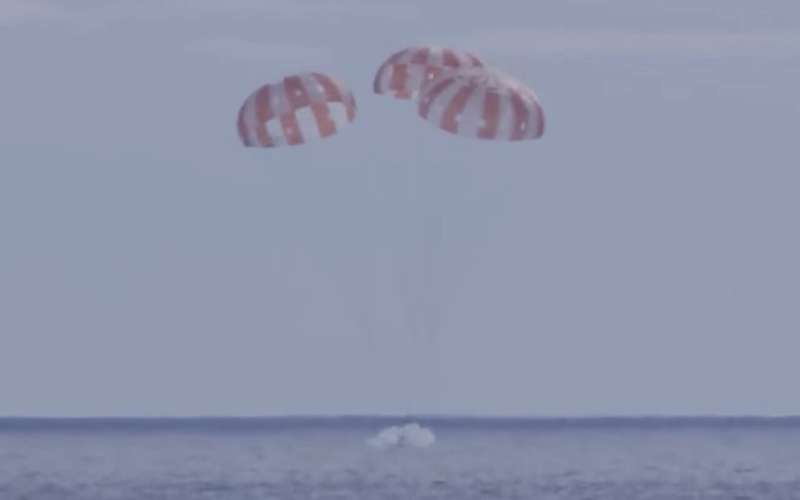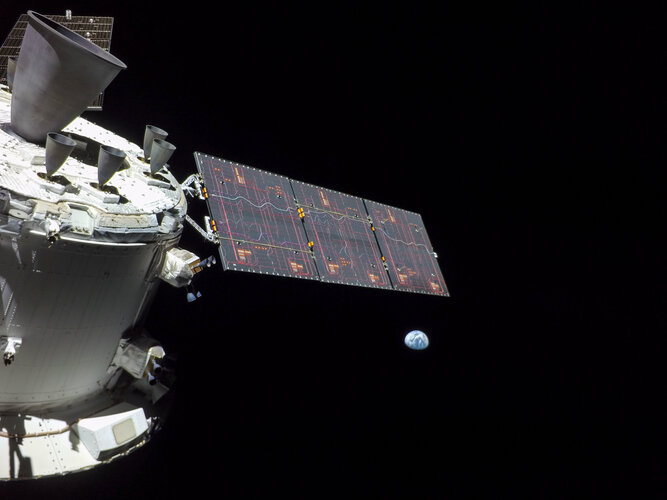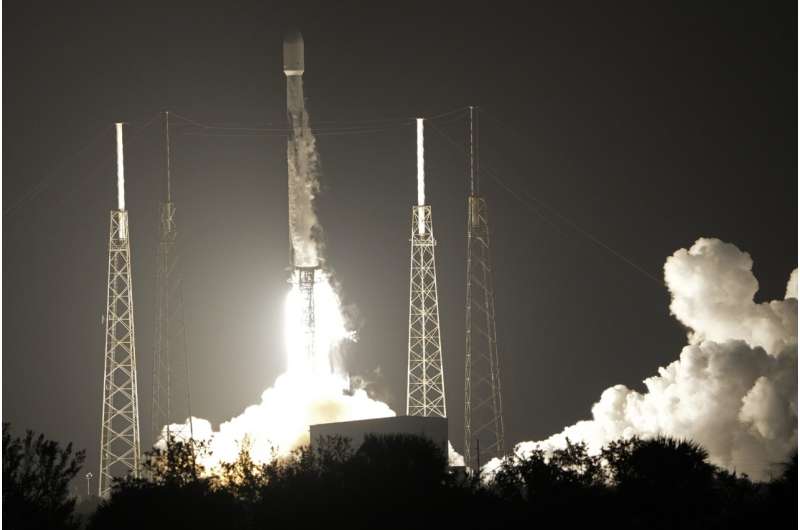
Copernical Team
After 15 Years, 1,000 Tests, Orion's Heat Shield Ready to Take the Heat
 When Artemis I launched on Wednesday, Nov. 16, NASA's new mega Moon rocket carried the Orion spacecraft?- uncrewed, for now - into orbit for the first time, and a new era of lunar exploration began. It's a big moment for NASA and the world. And, yet, one of the people whose work will be tested at the next crucial step - bringing Orion home safely - isn't nervous at all.
Jeremy Vander Kam i
When Artemis I launched on Wednesday, Nov. 16, NASA's new mega Moon rocket carried the Orion spacecraft?- uncrewed, for now - into orbit for the first time, and a new era of lunar exploration began. It's a big moment for NASA and the world. And, yet, one of the people whose work will be tested at the next crucial step - bringing Orion home safely - isn't nervous at all.
Jeremy Vander Kam i Practice makes perfect for student inventions at JPL competition
 Months of preparation led to three teams from one school taking home the top prizes at the 23rd Invention Challenge hosted by NASA's Jet Propulsion Laboratory.
After a two-year hiatus due to the pandemic, the Invention Challenge made a lively return to NASA's Jet Propulsion Laboratory in Southern California on Friday. Now in its 23rd year, the long-running tradition brings together student
Months of preparation led to three teams from one school taking home the top prizes at the 23rd Invention Challenge hosted by NASA's Jet Propulsion Laboratory.
After a two-year hiatus due to the pandemic, the Invention Challenge made a lively return to NASA's Jet Propulsion Laboratory in Southern California on Friday. Now in its 23rd year, the long-running tradition brings together student NASA capsule Orion splashes down after record-setting lunar voyage
 NASA's Orion space capsule splashed down safely in the Pacific on Sunday, completing the Artemis 1 mission - a more than 25-day journey around the Moon with an eye to returning humans there in just a few years.
After racing through the Earth's atmosphere at a speed of 25,000 miles (40,000 kilometers) per hour, the uncrewed capsule floated down to the sea with the help of three large orange
NASA's Orion space capsule splashed down safely in the Pacific on Sunday, completing the Artemis 1 mission - a more than 25-day journey around the Moon with an eye to returning humans there in just a few years.
After racing through the Earth's atmosphere at a speed of 25,000 miles (40,000 kilometers) per hour, the uncrewed capsule floated down to the sea with the help of three large orange Japanese startup launches historic Moon mission
 A Japanese startup's spacecraft was launched to the Moon on Sunday in the country's first-ever lunar mission and the first of its kind by a private company.
The launch was carried out by Elon Musk's SpaceX at Cape Canaveral in the US state of Florida after two postponements for additional pre-flight checks.
The spacecraft, produced by Tokyo-based startup ispace and carrying a UAE-built r
A Japanese startup's spacecraft was launched to the Moon on Sunday in the country's first-ever lunar mission and the first of its kind by a private company.
The launch was carried out by Elon Musk's SpaceX at Cape Canaveral in the US state of Florida after two postponements for additional pre-flight checks.
The spacecraft, produced by Tokyo-based startup ispace and carrying a UAE-built r NASA's Orion capsule blazes home from test flight to moon

NASA's Orion capsule made a blisteringly fast return from the moon Sunday, parachuting into the Pacific off Mexico to conclude a test flight that should clear the way for astronauts on the next lunar flyby.
Orion splashes down after record-setting voyage around the Moon
 NASA's Orion space capsule splashed down safely in the Pacific on Sunday, completing the Artemis 1 mission -- a more than 25-day journey around the Moon with an eye to returning humans there in just a few years. After racing through the Earth's atmosphere at a speed of 40,000 kilometers per hour (25,000 mph), the uncrewed capsule floated down to the sea with the help of three large red and white parachutes, as seen on NASA TV.
NASA's Orion space capsule splashed down safely in the Pacific on Sunday, completing the Artemis 1 mission -- a more than 25-day journey around the Moon with an eye to returning humans there in just a few years. After racing through the Earth's atmosphere at a speed of 40,000 kilometers per hour (25,000 mph), the uncrewed capsule floated down to the sea with the help of three large red and white parachutes, as seen on NASA TV. First Artemis lunar mission ends, so long European Service Module-1

Japanese company's lander rockets toward moon with UAE rover

A Tokyo company aimed for the moon with its own private lander Sunday, blasting off atop a SpaceX rocket with the United Arab Emirates' first lunar rover and a toylike robot from Japan that's designed to roll around up there in the gray dust.
It will take nearly five months for the lander and its experiments to reach the moon.
NASA's retired SOFIA aircraft finds new home at Arizona Museum
 NASA's now-retired Stratospheric Observatory for Infrared Astronomy (SOFIA) aircraft will find a permanent home in the Pima Air and Space Museum in Tucson, Arizona. The airplane is expected to make its final flight from NASA's Armstrong Flight Research Center in Palmdale, California, to Tucson on Tuesday, Dec. 13.
"The SOFIA mission has a powerful potential to inspire, from its discoveries
NASA's now-retired Stratospheric Observatory for Infrared Astronomy (SOFIA) aircraft will find a permanent home in the Pima Air and Space Museum in Tucson, Arizona. The airplane is expected to make its final flight from NASA's Armstrong Flight Research Center in Palmdale, California, to Tucson on Tuesday, Dec. 13.
"The SOFIA mission has a powerful potential to inspire, from its discoveries Meteorites plus gamma rays could have given Earth the building blocks for life
 Even as detailed images of distant galaxies from the James Webb Space Telescope show us more of the greater universe, scientists still disagree about how life began here on Earth. One hypothesis is that meteorites delivered amino acids - life's building blocks - to our planet.
Now, researchers reporting in ACS Central Science have experimentally shown that amino acids could have formed in
Even as detailed images of distant galaxies from the James Webb Space Telescope show us more of the greater universe, scientists still disagree about how life began here on Earth. One hypothesis is that meteorites delivered amino acids - life's building blocks - to our planet.
Now, researchers reporting in ACS Central Science have experimentally shown that amino acids could have formed in 
































